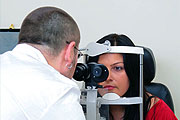Advanced eye care focused on you





Diagnosing common conditions
Clear, crisp vision is vital to your safety and well-being, no matter what your age. At Garden State Eye Center, our doctors are experts at treating everything from cataracts, glaucoma and other vision impairments. And now, thanks to new developments in the field, treatment of these conditions is much simpler and easier than ever before. Learn more about the eye care treatments provided at our center below.
Cornea drainage
The clear covering of your eye, known as the cornea, is susceptible to abrasions and erosion. Our eye doctors can treat these injuries with eye drops, ointments, special contact lenses, or antibiotics, depending on your special case.
Get treatment that exceeds your expectations from a team that has provided quality care to the area for over 30 years.
Don't suffer with your condition any longer - call today for the relief you need.
Macular degeneration
Macular degeneration is a condition affecting the macula, which is the center of your retina. There are two types of age-related macular degeneration: wet and dry. Dry is the more common form of the disease. If you are diagnosed with macular degeneration, your treatment options include vitamin supplements, photodynamic therapy and the surgical implantation of a telescopic lens.
Recommended follow-up: Every 6 months.
When it comes to clear vision, there is no room for compromise
Become more informed
Dealing with an eye condition can be a stressful time, but we're here to help. Schedule your appointment today to find out the options that are available to you. Contact us today for your eye exam and consultation.
Pterygium
A pterygium is a small mass of tissue that grows over your cornea. A small pterygium that becomes red and irritated can be treated with eye drops or ointments. However, if a pterygium becomes large enough to interfere with your vision, it should be surgically removed by our doctors.
Cataracts
A cataract is a clouding of your eye's natural lens. As a cataract matures, it causes your vision to deteriorate. When a cataract prevents you from performing everyday tasks like reading or driving, surgery is recommended.
During cataract surgery, the cloudy lens is removed and replaced with a clear plastic lens implant. This surgery is extremely common and safe. Our doctors have performed thousands of cataract surgeries.
Glaucoma
Glaucoma is a condition affecting your optic nerve, marked by an elevation in intraocular pressure. Fluid builds up and presses onto the optic nerve, causing nerve damage and vision loss. When medication fails to control the intraocular pressure in your eye, our doctors have several options, including selective laser trabeculoplasty, trabeculectomy, and drainage device implantation.
Recommended follow-up: Every 3 months.
Diabetic Retinopathy
If you have diabetes, you are at risk, for related eye conditions. Diabetic retinopathy is the leading cause of blindness in American adults. It is characterized by damage of the blood vessels in your retina. There are several treatment options for diabetic retinopathy, including scatter laser treatment and a procedure called vitrectomy.
Recommended follow-up: Every 6 months.

